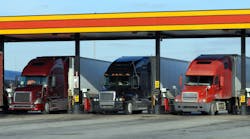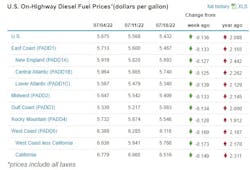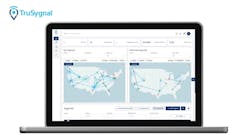The nationwide average for a gallon of diesel fell 13.6 cents from last week, continuing a weekslong trend of relief at the pump, according to data from the U.S. Energy Information Administration (EIA), as demand continues to wane in anticipation of a recession.
Diesel prices have declined for four straight weeks. The national average is $5.432 per gallon, according to the EIA’s data release on July 18. This is 37.8 cents lower than June 20, the most recent week the price has risen, with an all-time high of $5.81 nationally.
See also: Downward trend continues for diesel
The news gives consumers and carriers an idea that the pain in their pocketbooks is history, but diesel still is $2.088 higher than a year ago.
Gasoline prices have declined for more than 30 days in a row, with the EIA pricing gas at $4.49 nationally, a 15.6-cent decrease from last week.
“Global economic headwinds are pushing oil prices lower and less expensive oil leads to lower pump prices,” said Andrew Gross, spokesman for motor club AAA. “And here at home, [passenger vehicles] are fueling up less, despite this being the height of the traditional summer driving season. These two key factors are behind the recent drop in pump prices.”
AAA, which updates its prices daily whereas the EIA updates weekly, measured diesel at $5.515 on July 19, 11 cents lower than last week’s $5.625 and a 30.1-cent drop from an all-time high a month ago of $5.816 per gallon.
The price of diesel fell in every region of the country, according to EIA's July 18 data. Diesel is still over $5 per gallon in every region of the U.S., and over $6 on the West Coast, the most expensive region. California averaged $6.516 per gallon for the fuel, according to the most recent EIA numbers.
Lowering demand, lowering crude prices
The steady decline is due to lower demand for gasoline at the pump and a much lower global price for oil. The cost of a barrel of oil hovered around the mid-$90s last week, down from around $110 two weeks ago, and a recent peak of $122 for West Texas Intermediate (WTI) June 7, with June having correspondingly record diesel prices. West Texas Intermediate was priced at $100.41 per barrel as the market closed July 18.
In June, global oil production rose by 690,000 barrels per day to 99.5 million, according to Oil & Gas Journal, FleetOwner’s sister publication. They also reported that U.S. petroleum inventories have been rising, the amount up 3.3 million barrels from the previous week—and that week being 8.2 million barrels higher than the week before.
Amid falling demands, Oil & Gas Journal did state, in a summary of data from the International Energy Agency, that oil demand is expected to increase by 1.7 million barrels per day in 2022 and 2.1 million next year.





